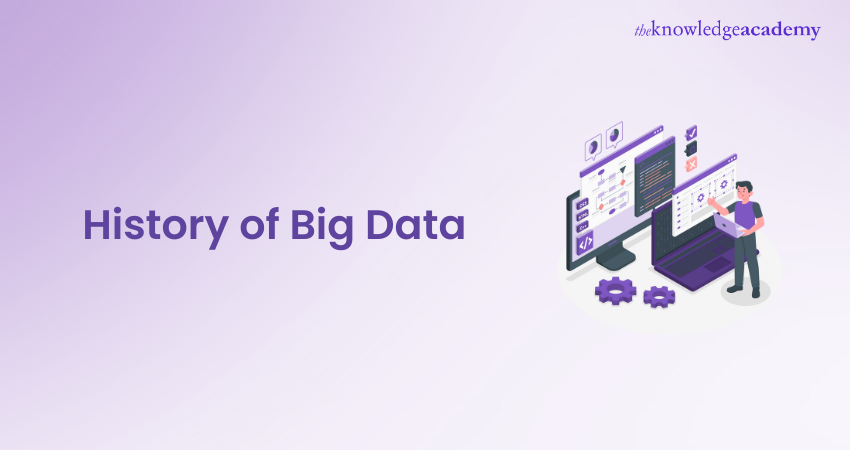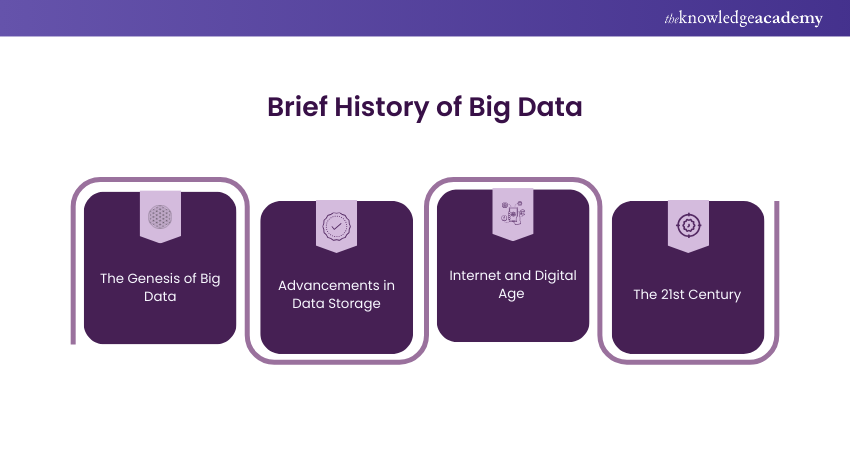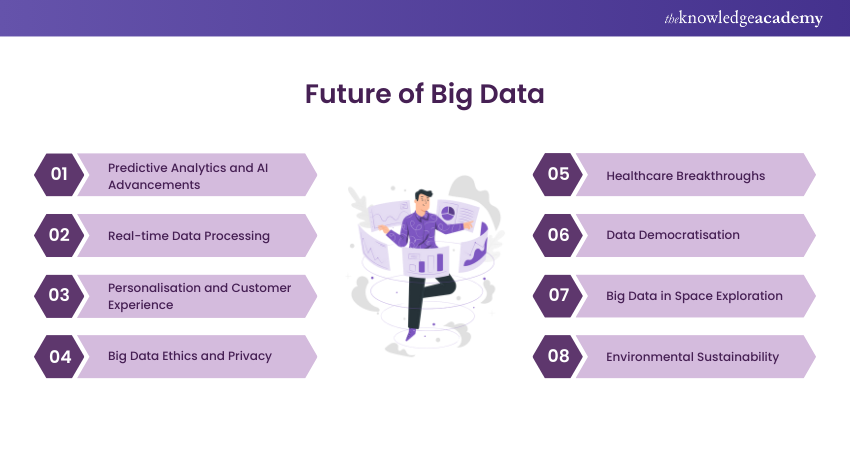We may not have the course you’re looking for. If you enquire or give us a call on +852 2592 5349 and speak to our training experts, we may still be able to help with your training requirements.
Training Outcomes Within Your Budget!
We ensure quality, budget-alignment, and timely delivery by our expert instructors.

In the continuously developing Information Technology (IT) sector, the concept of Big Data has emerged as a game-changer. It has revolutionised the way people collect, process, and utilise data. But do you know how the concept emerged and what the History of Big Data is?
According to Statista, the global Big Data market was valued at £212.53 billion GBP. However, people are still unaware of its rich history and roots. Read this blog to delve into the History of Big Data. Also, explore the various phases of its journey and how it will continue to transform the IT world.
Table of Contents
1) Overview of the History of Big Data
a) The genesis of Big Data
b) Advancements in data storage
c) Internet and digital age
d) The 21st Century
2) Big Data in various industries
3) The future of Big Data
4) Conclusion
Overview of the History of Big Data
In the digital age, the term Big Data has become ubiquitous, representing the massive volumes of information that inundate organisations across the globe. But the concept of handling large datasets dates back to the early days of computing, setting the stage for the captivating Big Data History. So, let’s explore the brief History of Big Data:

1) The Genesis of Big Data
The History of Big Data can be traced back to the early days of computing, where the groundwork for handling large datasets was laid. As early as the 1940s and 1950s, the concept of storing and analysing vast amounts of data began to take shape. However, it wasn't until several decades later that the term "Big Data" gained popularity and significance.
2) Advancements in Data Storage
In the 1960s and 1970s, mainframe computers emerged, offering more substantial data storage capacities than ever before. Organisations started to recognise the potential of storing vast volumes of information, leading to the development of early Database Management Systems (DBMS). These systems allowed for more organised data storage and retrieval, setting the stage for future innovations in data handling.
The 1980s saw a significant leap forward with the advent of relational databases, which provided a more flexible and scalable way of managing data. This era witnessed the emergence of companies specialising in Database Management, further pushing the boundaries of data storage capabilities.
Discover the cutting-edge techniques in Big Data Analysis. Join our Big Data Analysis Course now!
3) Internet and Digital Age
The 1990s marked a revolutionary shift with the rise of the internet and the proliferation of digital technologies. As more and more people gained access to the internet, the amount of digital data being generated exploded exponentially. This gave rise to a new set of challenges and opportunities for businesses and researchers alike.
With the internet becoming a vast repository of information, search engines like Google and Yahoo emerged, making it easier to access and retrieve data from the web. This accessibility and the exponential growth of online data contributed to the early stages of Big Data as we know it today.
4) The 21st Century
The 21st century brought about a data revolution. The explosion of social media, mobiles, and the Internet of Things (IoT) created an unprecedented data deluge. The sheer volume, velocity, and range of data being generated led to the coining of the term “Big Data” around the mid-2000s.
In 2005, Hadoop, an open-source framework for distributed storage and processing of large datasets, was introduced by Doug Cutting and Mike Cafarella. Hadoop revolutionised the way data was handled, allowing organisations to store and process vast amounts of data across clusters of commodity hardware.
Simultaneously, Cloud Computing emerged as a game-changer in data storage and analysis. Companies like Amazon Web Services (AWS), Microsoft Azure, and Google Cloud Platform (GCP) provided scalable and cost-effective solutions for handling Big Data. This democratised access to powerful computing resources, enabling businesses of all sizes to leverage Big Data for their operations and decision-making processes.
As technology advanced, data analytics and machine learning became inseparable companions of Big Data. Organisations realised the potential of extracting valuable insights from their massive datasets. Predictive analytics, data mining, and artificial intelligence-driven algorithms helped businesses make data-driven decisions, improve customer experiences, and optimise various processes.
Furthermore, the importance of security and data privacy came to the forefront. With increasing concerns about data breaches and unauthorised access, regulations like the General Data Protection Regulation (GDPR) were implemented to protect consumers’ data rights.
Don't miss this opportunity to stay ahead in the data-driven world! Join our Big Data and Analytics Training today!
Big Data in Various Industries
Big Data has become a game-changer in various industries, revolutionising how businesses operate and make decisions. Its immense potential to analyse vast amounts of data in real time has opened up new opportunities for efficiency, innovation, and growth. Let’s explore how it is making a significant impact across different sectors:
Healthcare and Medical Research
Big Data is revolutionising the healthcare industry by enhancing patient care and advancing medical research. Data from electronic health records, wearable devices, and medical imaging provides healthcare professionals with insights into patient health trends and potential risks. Predictive analytics aids in early disease detection, personalised treatment plans, and improved patient outcomes.
Finance and Banking
In the finance sector, Big Data is essential for risk assessment, fraud detection, and customer analytics. Financial institutions analyse large volumes of transactional data to identify suspicious activities, protecting customers from fraud. Additionally, Big Data helps banks understand customer preferences, enabling them to offer personalised financial services and products.
Retail and Customer Insights
Big Data has transformed the retail industry by providing valuable insights into customer behaviour. By analysing purchase patterns and behaviour, retailers can optimise inventory management, create targeted marketing campaigns, and enhance the shopping experience. Online retailers use Big Data to recommend products based on customers' browsing history and past purchases.
Transportation and Logistics
In transportation and logistics, Big Data is crucial for optimising routes, managing supply chains, and predicting maintenance needs. By analysing real-time data from GPS devices and vehicle sensors, companies can enhance delivery efficiency and reduce operational costs.
Government and Public Services
Big Data has significantly impacted the public sector, with governments using data analytics to address challenges like traffic management, urban planning, and disaster response. It enables data-driven decision-making, improving public services and overall efficiency.
Manufacturing and Industry 4.0
In manufacturing, Big Data is a cornerstone of Industry 4.0, the fourth industrial revolution. IoT sensors and devices collect real-time data from production lines, optimising processes, reducing downtime, and improving product quality. Predictive maintenance allows manufacturers to anticipate equipment failures and schedule maintenance proactively.
Education
Big Data is transforming education by enabling personalised learning experiences. Educational institutions analyse student performance, engagement, and learning preferences to create tailored learning paths. This data-driven approach allows educators to identify at-risk students early and implement interventions to enhance academic outcomes.
Media and Entertainment
The media and entertainment industry leverages Big Data to understand audience preferences and behaviour. Streaming services use data analysis to recommend content, boosting user engagement and satisfaction. Additionally, media companies optimise advertising strategies and target relevant audiences more effectively through data insights.
Energy and Utilities
In the energy sector, Big Data plays a key role in smart grid management and energy optimisation. Data from smart meters and sensors allows utility companies to monitor energy consumption patterns, predict demand, and improve energy distribution efficiency, reducing wastage.
Unleash the true potential of data with our comprehensive Big Data Architecture Training.
The Future of Big Data
After you have read about History of Big Data, it’s time to look towards its future. The future of Big Data is poised to be even more exciting and promising, with continuous advancements in technology and data analytics. As the world progresses, it is expected to play a pivotal role in reshaping industries, enhancing decision-making processes, and driving innovation. Here are some key aspects that highlight the bright future of this marvel:

Predictive Analytics and AI Advancements
Big Data's role in predictive analytics will become increasingly precise as data sets grow larger and more diverse. Advancements in Artificial Intelligence (AI) and machine learning will enable businesses to make highly accurate forecasts, enhancing strategic planning, resource optimisation, and Risk Management across various industries.
Real-time Data Processing
The future will see a rising demand for real-time data processing, driven by the proliferation of the Internet of Things (IoT) and connected devices. Big Data systems will need to manage this surge in real-time data to support instant decision-making, especially in critical sectors like healthcare, transportation, and finance.
Personalisation and Customer Experience
Big Data will be key in delivering personalised customer experiences. Through deep data analysis, businesses will gain a better understanding of individual preferences and behaviours, allowing them to customise products, services, and marketing efforts, thereby boosting customer satisfaction and loyalty.
Big Data Ethics and Privacy
As Big Data evolves, ethical considerations and privacy concerns will become increasingly important. Balancing the use of data for valuable insights with the protection of individual privacy will be crucial. Regulatory frameworks will continue to develop to ensure responsible data usage and safeguard privacy.
Healthcare Breakthroughs
Big Data will drive significant advancements in healthcare. With greater access to medical data, researchers can identify patterns in diseases, treatments, and patient outcomes. Personalised medicine will become more prevalent, with treatments tailored to individual genetic profiles and medical histories.
Data Democratisation
The future of Big Data includes greater data democratisation, making data and insights more accessible across organisations. User-friendly data visualisation tools will empower individuals to interpret data, leading to more widespread data-driven decision-making.
Big Data in Space Exploration
Big Data will play a crucial role in space exploration, processing vast amounts of information from telescopes, satellites, and probes. This analysis will help scientists uncover new insights about the universe and our place within it.
Environmental Sustainability
Big Data will contribute to environmental sustainability by analysing data on climate change, resource usage, and environmental impact. The insights gained will inform strategies for conservation, renewable energy adoption, and waste reduction, aiding in the fight against climate change.
Conclusion
The History of Big Data reveals a transformative journey that has revolutionised industries and redefined how we interact with information. Embracing the power of Big Data while safeguarding individual rights will be key to shaping a future. Data will continue to be a force for positive change, fuelling progress in diverse fields and enriching our lives.
Master the art of integrating Big Data Analytics and Data Science by signing up for our Big Data Analytics & Data Science Integration Course.
Frequently Asked Questions

John Mashey, a former Chief Scientist at Silicon Graphics, is often considered the "Father of Big Data" for his contributions to the development and popularisation of the concept in the 1990s.

Data evolution traces back to early record-keeping, advancing through the development of databases, data warehousing, and analytics. The rise of Big Data began with the internet boom, leading to sophisticated data processing technologies and massive data generation.

The Knowledge Academy takes global learning to new heights, offering over 30,000 online courses across 490+ locations in 220 countries. This expansive reach ensures accessibility and convenience for learners worldwide.
Alongside our diverse Online Course Catalogue, encompassing 17 major categories, we go the extra mile by providing a plethora of free educational Online Resources like News updates, Blogs, videos, webinars, and interview questions. Tailoring learning experiences further, professionals can maximise value with customisable Course Bundles of TKA.

The Knowledge Academy’s Knowledge Pass, a prepaid voucher, adds another layer of flexibility, allowing course bookings over a 12-month period. Join us on a journey where education knows no bounds.

The Knowledge Academy offers various Big Data & Analytics Courses, including Hadoop Big Data Certification Training, Apache Spark Training and Big Data Analytics & Data Science Integration Course. These courses cater to different skill levels, providing comprehensive insights into Key Characteristics of Big Data.
Our Data, Analytics & AI Blogs cover a range of topics related to Big Data, offering valuable resources, best practices, and industry insights. Whether you are a beginner or looking to advance your Big Data Analytics skills, The Knowledge Academy's diverse courses and informative blogs have got you covered.
Upcoming Data, Analytics & AI Resources Batches & Dates
Date
 Hadoop Big Data Certification
Hadoop Big Data Certification
Thu 16th Jan 2025
Thu 6th Mar 2025
Thu 22nd May 2025
Thu 24th Jul 2025
Thu 11th Sep 2025
Thu 20th Nov 2025
Thu 11th Dec 2025







 Top Rated Course
Top Rated Course



 If you wish to make any changes to your course, please
If you wish to make any changes to your course, please


